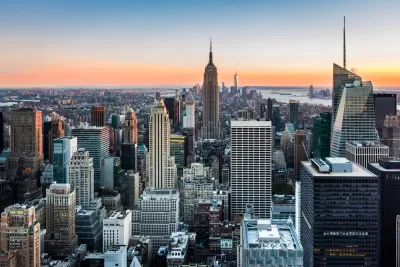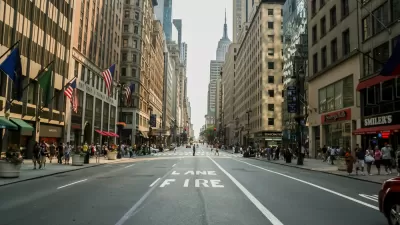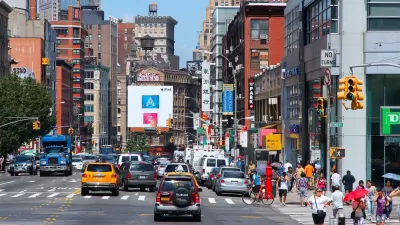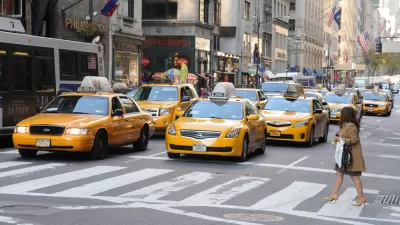While the city determines where to place parking meters and how much to charge, when it comes to charging tolls to drive in Manhattan, the city's elected leaders are excluded from the political process.

Congestion pricing is very much in the news throughout the New York metropolitan area since the Fix NYC panel released their advisory report on Jan. 19 recommending a toll of $11.52 for passenger vehicles and $25.34 for trucks driving south of 60th Street in Manhattan. Unlike a similar plan proposed by former Mayor Michael Bloomberg, approved by the City Council in March 2008, state legislators from Buffalo and Binghamton, not city council members from the Bronx and Brooklyn, will be among those determining the outcome of the congestion pricing plan [pdf].
Why is plan exempt from home rule?
"The answer lies in Article IX of the New York Constitution, which outlines the state’s responsibilities and powers over its local governments, including their very creation," reports Jesse McKinley for The New York Times on Jan. 19.
Leverage over local affairs was codified in a 1929 case, Adler v. Deegan, which found so long as there was “substantial” state interest, the Legislature could act on matters of “property, affairs or government,” an opinion — written by the jurist Benjamin Cardozo — that has been widely construed [pdf].
And while the issue of home rule — the ability of local governments to manage their own affairs — still generates lawsuits and calls for constitutional reform, the state’s authority has been upheld by the state’s highest court, the Court of Appeals.
It wouldn't be the first time that the state has meddled in local matters. Planetizen reported on state legislation in 2016 to remove density caps on residential buildings in New York City. However, the bills were authored by a Brooklyn legislator, and the reason was simple: "In the city of New York, residential FAR is actually set by the state," wrote Planetizen editor James Brasuell.
McKinley also cites the example of "the Legislature overruling the city on issues like fees for plastic bags."
Congestion pricing plan subject to change
The plan [pdf] presented by the Fix NYC advisory panel on Jan. 19 won't be what is ultimately decided by the legislature, assuming it is proposed as legislation.
"[Gov. Andrew Cuomo (D)] said that he would review the task force’s report and discuss options with state lawmakers over the next several months," reported Winnie Hu and Vivian Wang for The New York Times on Jan. 19. "He can reject any or all of the plan."
Already there are signs that the governor is wavering on the most important part of the plan, charging motorists a toll, of any amount, for driving into the "congestion charge zone" in Manhattan, report Eileen AJ Connelly and Gwynne Hogan for the New York Post on Jan. 20.
While [Cuomo] endorsed the part of the Fix NYC plan released Friday that would charge for-hire cars to travel through Manhattan south of 60th Street, he slammed the brakes on repeated questions by a reporter about the bigger proposal to charge private cars entering the zone.
“My focus is on for-hire vehicles,” said Cuomo, blaming them most for worsening gridlock.
In his New York Times op-ed on Jan. 7, David Leonhardt called that "a strangely anti-environment compromise, because it encourages people to own their own cars. The New York of the future should have fewer space-clogging cars, not more." He also warned that Cuomo and New York City Mayor Bill de Blasio may "bungle" the opportunity to use congestion pricing to both mitigate congestion and fund public transit.
FULL STORY: New York State, Not the City, Will Decide Congestion Pricing. Here’s Why.

Planetizen Federal Action Tracker
A weekly monitor of how Trump’s orders and actions are impacting planners and planning in America.

Congressman Proposes Bill to Rename DC Metro “Trump Train”
The Make Autorail Great Again Act would withhold federal funding to the system until the Washington Metropolitan Area Transit Authority (WMATA), rebrands as the Washington Metropolitan Authority for Greater Access (WMAGA).

DARTSpace Platform Streamlines Dallas TOD Application Process
The Dallas transit agency hopes a shorter permitting timeline will boost transit-oriented development around rail stations.

Renters Now Outnumber Homeowners in Over 200 US Suburbs
High housing costs in city centers and the new-found flexibility offered by remote work are pushing more renters to suburban areas.

The Tiny, Adorable $7,000 Car Turning Japan Onto EVs
The single seat Mibot charges from a regular plug as quickly as an iPad, and is about half the price of an average EV.

Supreme Court Ruling in Pipeline Case Guts Federal Environmental Law
The decision limits the scope of a federal law that mandates extensive environmental impact reviews of energy, infrastructure, and transportation projects.
Urban Design for Planners 1: Software Tools
This six-course series explores essential urban design concepts using open source software and equips planners with the tools they need to participate fully in the urban design process.
Planning for Universal Design
Learn the tools for implementing Universal Design in planning regulations.
Municipality of Princeton
Roanoke Valley-Alleghany Regional Commission
City of Mt Shasta
City of Camden Redevelopment Agency
City of Astoria
Transportation Research & Education Center (TREC) at Portland State University
US High Speed Rail Association
City of Camden Redevelopment Agency
Municipality of Princeton (NJ)





























